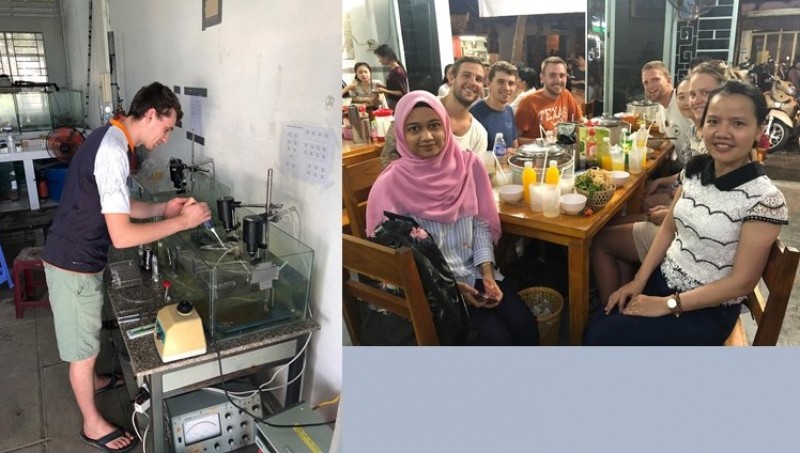Acid-Base and ion regulation in a hypercapnic world
Dan Montgomery
University of Exeter

I would like to thank The Challenger Society for their generous financial support in contributing to my travel expenses to attend a two week international graduate student workshop ‘Acid-base and ion regulation in a hypercapnic world’ hosted by Can Tho University in Vietnam.
This course focused on the impacts of changes in water chemistry on the internal biology of fishes. Specifically how rising carbon dioxide in the environment impacts upon pH regulation and ion regulation of fish and the consequences of this on physiology and behaviour of fish. The course was a mix of daily lectures and practical research with a particular highlight the opportunity to learn how to implant cannulas in fish in order to take blood samples to analyse blood chemistry without the need to remove fish from water. This allows samples to be taken from fish in a state of low stress.
In addition to general lectures and practical training members of the course were assigned to small groups to conduct a short research project focusing on one aspect of acid-base regulation covered in the lectures. I was part of a group working under the supervision of Dr Colin Brauner from the University of British Columbia. As part of our project we investigated the presence of ?-NHE in red blood cells of 7 species of fish found in the Mekong Delta. These molecules allow regulation of intracellular red blood cell pH by exchanging protons with sodium external to the cell. As haemoglobin of fish is highly pH sensitive, regulating internal blood cell pH is key to maintaining oxygen transport and supply when fish experience abrupt changes in water chemistry.
We also investigated mechanisms some fish can use to enhance oxygen delivery. Fish can exploit the pH sensitivity of haemoglobin to enhance oxygen supply at the tissue by deliberately reducing internal pH of red blood cells. Tissues produce CO2 as a by-product of respiration which reduces blood pH in the capillaries. To enhance oxygen unloading fish with ?-NHE can short circuit this mechanism of pH regulation to reduce blood cell pH and enhance oxygen delivery to the tissues. This is achieved by the presence of an enzyme called carbonic anhydrase which converts the proton exported by the ?-NHE into CO2 which is absorbed by the red blood cell thus maintaining reduced pH inside the blood cell. To investigate this effect we focussed on two species of air breathing fish, one which possessed ?-NHE and one that did not. We inhibited the activity of carbonic anhydrase in the blood of both species and observed changes in air breathing frequency before and after inhibition. In the species which carbonic anhydrase was present the inhibition of this enzyme resulted in an increase in breathing rate – this demonstrates that the prevention of enhanced oxygen unloading at the tissues resulted in the animal needing to increase its breathing rate in order to deliver enough oxygen to meet demands in the tissues.
This research project was extremely interesting and gave me the opportunity to work with techniques, equipment and animals that I have not previously had experience of. It also developed my knowledge and understanding of oxygen transport in fish, which will be especially useful for aspects of my PhD focussing on tolerance to low oxygen in UK fish species.
Although the course was extremely challenging with long days of lecture and lab work it was a fantastic experience. One of the aspects I was particularly looking forward to was the opportunity to meet and work with several world-leading researchers in the field of fish physiology. This was indeed a highlight of the course and the opportunity to discuss research ideas and future projects will be an immense benefit for the remainder of my PhD. In addition meeting the rest of the students on the course was also great! There were a fantastic diversity of students with people attending from all around the world including America, Canada, Japan, Europe, Malaysia and Vietnam. It was amazing to work with these people and they made the course a lot of fun despite the high work load. Finally, it was amazing to visit Vietnam and explore some of the city of Can Tho in our (albeit brief) spare time. Having never visited south-east Asia before it was certainly an experience I will never forget!
Latest News
Royal Society Publishing Photography Competition 2025
Please see a message from the Royal Society below:
We are delighted to announce that the 2025 Competition is now open for entries until 15 August for a chance to win £1000! The competition celebrates the power of photography in conveying the wonder of science happening all around us and photographs can be submitted in the categories of: Astronomy, Behaviour, Earth Science and Climatology, Ecology and Environmental Science, and Microimaging.
The competition is free to enter and open to anyone studying or working in science at graduate level or above. Category winners will receive a one-year membership to the Royal Photographic Society and the overall winner will receive a grand prize of £1,000. Find out more: https://bit.ly/RSPphotocomp
October 2025 MEDIN Workshop: Marine Data Management, Governance and the MEDIN toolset
The Marine Environmental Data and Information Network (MEDIN) are pleased to announce that registration is now open for the next occurrence of our popular free online training workshop: ‘Marine Data Management, Governance and the MEDIN toolset’ on the 13th – 17th October 2025 on OceanTeacher Global Academy.
Marine Data Management, Governance and the MEDIN toolset
The Marine Environmental Data and Information Network (MEDIN) and OceanWise are delighted to invite you to attend our popular free online training workshop: ‘Marine Data Management, Governance and the MEDIN toolset’ on the 19th – 23rd of May 2025.
